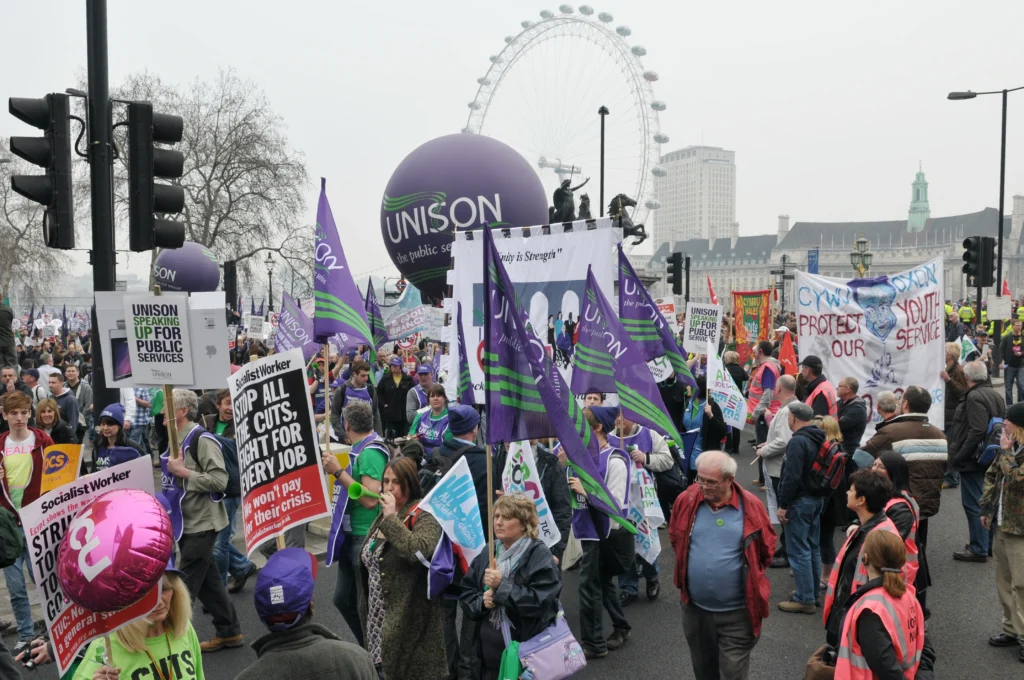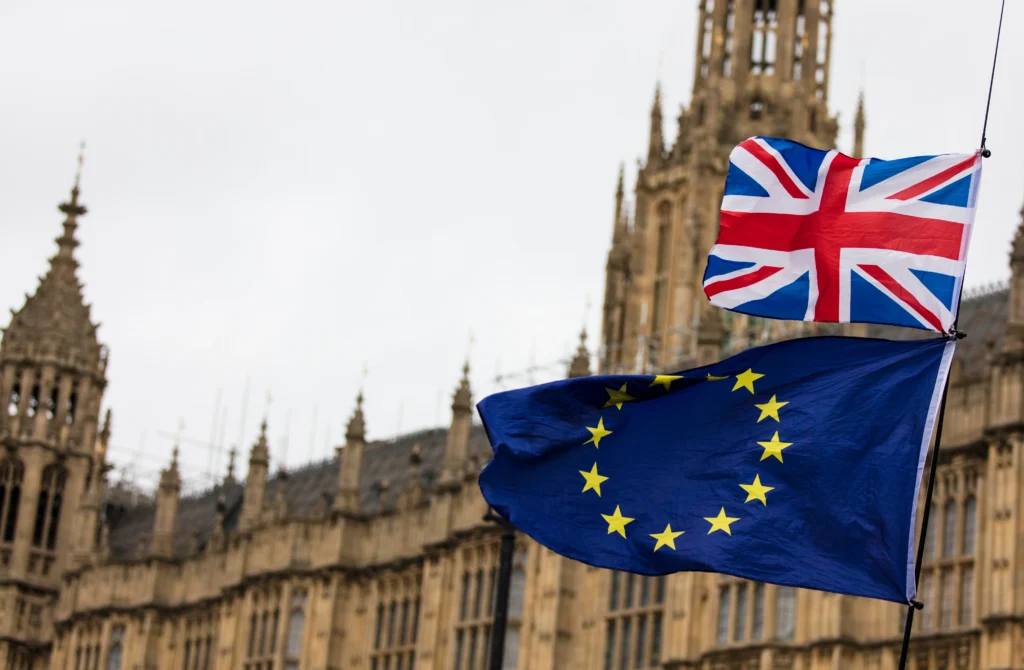Political tensions are running high. Amid economic instability, a cost-of-living crisis, and growing public discontent, right-wing populism is once again finding fertile ground. Reform UK, under the leadership of Nigel Farage, has emerged as a serious electoral threat, especially to traditional Conservative seats and working-class voters disillusioned with Westminster. Reform UK, now consistently ahead in the opinion polls, are starting to adopt policy positions to appeal to traditional Labour voters in red wall seats, even pitching to the left of Labour in some cases.
A direct threat to workers’ rights
In this climate, the Trade Union movement which represents over six million workers across the UK has a vital role to play. More than just defending workplace rights, decent pay and conditions and other social causes, trade unions are uniquely positioned to mobilise communities, influence political debate, and defend democratic values. If organised effectively, their collective power could prove instrumental in stopping a Reform UK surge and in steering the national conversation back toward solidarity, fairness, and economic justice.
Reform UK presents itself as the party of “common sense,” offering simple answers to complex problems. It has capitalised on anger over immigration, net zero policies, and so-called “woke culture,” aiming much of its messaging at traditional Labour heartlands and disenchanted voters. But behind the rhetoric lies a platform that threatens trade unionism, workers’ rights, and public services. Many of their senior figures have in the past spoken openly of needing to reduce the size of the state, which is coded language for cutting public services.
Reform has proposed further strengthening restrictions on strikes and industrial action and the acceleration of replacing public sector jobs with automation and outsourcing. They have also spoken of a “bonfire of regulations” affecting workplace protections. They advocate tax cuts favouring higher earners. They have faced criticism for failing to make their policies add up and their leadership spoke favourably of former Prime Minister Liz Truss’s mini budget which sunk the UK economy.
In essence, Reform UK’s agenda undermines collective bargaining, weakens job security, and promotes a race to the bottom for working conditions. That makes its rise not just a political challenge but a direct threat to the foundations of organised labour and the rights of working people across the UK. These rights were hard won – let us not forget it took one hundred years of campaigning to finally achieve the National Minimum Wage. We cannot let these rights be taken away without a fight.
The power and responsibility of Trade Unions
Trade unions are the largest organised civil society force in the UK. Their strength lies not just in formal membership numbers, but in their grassroots structures: branch networks, shop stewards, regional officers, and campaign units embedded in thousands of workplaces. Few other organisations can match that reach and that power to deliver change.
At a time when many voters feel politically abandoned, unions offer a connection point. From postal workers and NHS staff to transport engineers and call centre employees, unions are in constant dialogue with millions of workers across all regions of the UK. That gives them a rare and unique capacity to listen, organise, and act and counter the populist narrative of reform that offers simply but unworkable solutions to complex modern economic, social and political challenge.
To see off the threat of Reform, the union movement must work with civil society, community groups, charities, churches and the Labour Party to rebuild trust and engagement in communities where political disillusionment has taken hold. Unions need to help by challenging right-wing narratives on migration, jobs, and social change with facts, solidarity and organisation. There have been excellent examples of union campaigns to defend green jobs from Reform policies, and this needs to be developed and more widely spread. The TUC released an excellent campaign video featuring workers in green manufacturing jobs asking why Nigel Farage wanted to shut them down. Unions have a key role in mobilising voters especially young, precarious, and low-income workers to use their voice at the ballot box and oppose Reforms damaging policies.
One of the biggest opportunities, and indeed biggest challenges for trade unions is to expand organising efforts beyond the public sector and traditional strongholds. The gig economy, zero-hours contracts, and precarious private-sector roles have created a fragmented workforce often excluded from union structures and traditional working methods. Yet these very workers, those in warehouses, delivery networks, hospitality, freelancers and care are among the most vulnerable to the exploitative policies championed by Reform UK. But many, alienated by traditional politics, are leaning towards Reform.
Unions like Unite, GMB, and the IWGB have shown what is possible through high-profile campaigns at companies like Amazon, Deliveroo, and Uber. Expanding these organising drives and tying them to broader political education about what’s at stake in the next election, could create new alliances that outflank and crush right-wing populism.
Building alliances for a fairer Britain
Reform’s electoral rise has been driven in part by the manipulation of fear. Fear over immigration, cultural identity, and economic security. Countering this requires more than policy rebuttals. It demands deep political education and solidarity-building at the community level. Unions have long played a role in adult learning, workplace training, and civic education. Revitalising this function through events, newsletters, podcasts, community drop-ins, and online content and even non-traditional routes such as concerts, films and media can give workers the tools to push back against misinformation and division.
In partnership with progressive think tanks and local campaigners, unions can develop narratives rooted in shared economic interest, not scapegoating. The simple truth is: working people don’t benefit from tax cuts for the rich or from cutting public services, they benefit from decent pay, secure jobs, and strong social safety nets and good public services. All these things are at risk under a possible Reform government.
Perhaps the most direct route to stopping Reform UK is also the simplest: help elect a government that supports workers’ rights and social investment. Labour, under Keir Starmer, has brought forward the twenty-first century’s first major step forward for worker’s rights in the form of the Employment Rights Bill and has committed to repealing anti-union laws, introduce Fair Pay Agreements, and build an economy based on partnership, not exploitation. Labour and the Unions are a family. There have always been disagreements but the marriage between Labour and the Unions has been the strongest force for social progress in British history. The relationship must endure and continue to be the champion of working class communities and working people up and down the country.
Unions have the infrastructure to play a crucial role in voter registration drives, door-to-door canvassing, phone banks, and social media mobilisation. Many are already ramping up political activity in marginal seats where the risk of Reform or hard-right Conservative wins is highest. The solidarity between Labour and the Unions, when united and determined can beat the right. The Trades Union Congress (TUC), Unison, and other affiliates are also exploring regional alliances to coordinate action and avoid fragmentation. The aim is clear: to ensure that the next government, whatever its complexion, defends the right to organise and puts working people at the heart of economic recovery. That next government must be a Labour government.
The trade union movement’s role in this moment goes far beyond self-preservation. It is about defending the very idea of collective action, of community, and of democracy itself. Reform UK’s politics thrive on cynicism, division, and individualism. The trade union movement stands for solidarity, mutual aid, and hope. If the unions can rise to this challenge of organising at the grassroots, educating their members, and mobilising communities they could do more than block a Reform government. They could help lay the foundations for a fairer, more democratic Britain. A new Jerusalem. Now is the time to act.




